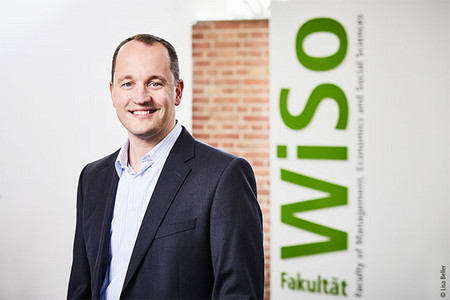"The award honors empirical work on innovation management of excellent scientific quality that deals with a relevant problem." This is the award criteria for the Jürgen Hauschildt Prize, which the Verband der Hochschullehrer für Betriebswirtschaft (VHB) awards every autumn for the "best scientific publication on empirically founded innovation management".
This year, Prof. Dr. Fabian J. Sting can be pleased about the recognition by his colleagues. Prof. Dr. Sting, from the Supply Chain Management Area of the WiSo Faculty, was awarded for the work published jointly with Prof. Dr. Christoph Fuchs and Prof. Dr. Oliver Alexy from the Technical University Munich and Dr. Maik Schlickel (Nobilia GmbH, Gütersloh): The Ideator's Bias: How Identity-induced Self-efficacy Drives Overestimation in Employee-driven Process Innovation.
In their study, the researchers investigated how it can happen that ideators in a company do systematically err in predicting the value of their own innovation idea and why certain ideas are more prone to biased evaluations than others.
Biased idea evaluations are closely related to the self-efficacy that an ideator within a company can derive from its specific role and social identity. It is therefore a situation-specific perspective from which overconfidence in innovation ideas result. Fabian J. Sting and his colleagues tested this research prediction on the basis of one of a corporate dataset on process innovations and their valuations. Furthermore, they triangulated the predicted mechanism. Through a series of additional interviews and four scenario-based experiments, they were able to exclude alternative explanations.
The researchers found that ideas from employees at a higher (vs. lower) organizational level and from employees generating ideas in groups (vs. individually) are more prone to an ideator’s bias. The situation-specific, identity-based approach was thus confirmed.
The findings have important practical consequences for companies and organizations. in a real-life organizational context, the findings make it easier to predict when an ideator’s bias prevails. At the same time, the results raises caution about some current proxies to identify high-potential ideas (e.g., of groups whose creativity may be viewed), because the understanding of the true value of ideas is essential for a companies' innovation success.
WiSo Dean Ulrich W. Thonemann congratulated Professor Sting and also the entire WiSo Faculty is pleased about the participation in the “best scientific publication of the year on empirically based innovation management”.
• The study is published in the Academy of Management Journal
• Prof Dr Fabian J. Sting’s find an expert-page
Innovation management study awarded

WiSo Faculty social media channels
[ follow us! ]